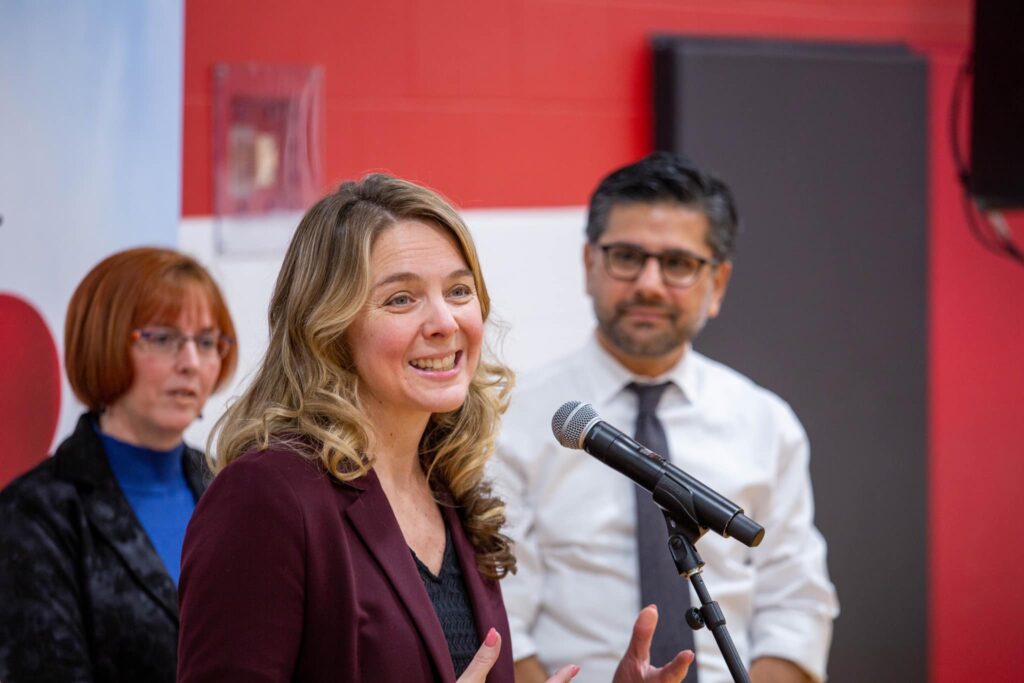
Jennifer Stewart: Minister Sudds, there’s a lot going on in the world right now, and obviously you are incredibly busy. How are you feeling right now?
Jenna Sudds: I feel good. A lot is going on in the world, and I certainly feel that and hear that in my conversations, but I feel well placed. I feel well supported to help advance some really important work we have in front of us.
Catherine Clark: You know, Minister, one of the things that I think a lot of women are feeling right now is a sense of uncertainty. The institutions that we’ve worked so hard to create space where there’s a sense of equality, that our daughters and sons will be able to exist within a safe environment… there’s uncertainty about whether that is being undermined. How are you feeling about that right now, especially as a mom?
Jenna Sudds: I’m a mom of three teenage daughters, so I can certainly relate to those fears, which are real. We are living in unprecedented times right now, but again, I take reassurance in being part of an amazing team of people, both elected officials, business leaders, nonprofit leaders, the broader community, and Canadians at large, who have really rallied and have really stepped up to meet the moment and rally around the challenge that we have ahead of us. That feels good. It gives me confidence that we are going to overcome these challenges. And, you know, one foot in front of the other.
Jennifer Stewart: I remember when you decided to run for Ottawa city council, which was your first time running for elected office. Suppose you go back as a woman in politics who has now run successfully a few times. What advice would you give Jenna Sudds when she’s just about to dip her toes into elected politics?
Jenna Sudds: Looking back, the best advice I would give myself is to surround myself with good people. It’s really important, as you do this type of work, to stay grounded and make sure you have people around you who will keep you on track, keep you accountable, and support you through the good and the bad, right? It’s challenging work, but ultimately, when you have that support and grounding, you are much better positioned to do it well.
Catherine Clark: I would love to talk to you about the fact that you’re a federal minister, but you’re also a local MP, and that means that when you go to the grocery store, you can’t really set aside the mantle of the work that you do and buy your lettuce. You’re in constant contact with your constituents as well. That can be good and bad, right? It can be good in that you get a touch point, but it can be bad in that we’ve broken down these lines between viewing political leaders as objects at whom we can hurl insults. How do you handle that on a day-to-day basis?
Jenna Sudds: Well, first of all, I consider myself very lucky. In this community in Ottawa, in Canada, throughout my career, I have been able to build some great relationships. And I’m also very fortunate to be a Member of Parliament, a cabinet minister who lives in Ottawa, who is not traveling back and forth, day in and day out, week after week. I’ll admit, when my children were younger, when I was at the grocery store with the kids, trying to do that and be a mom, and then engaging with folks who had questions or issues, that’s really, really challenging. It is a bit easier these days because my teenagers aren’t interested in going to the grocery store with me, so it’s a bit easier, but honestly, they’re typically really good conversations, and I feel blessed.
I also really appreciate that people feel like they can approach me and have a dialogue wherever I am in the community. That’s a good thing. Frankly, I think it’s good for our democracy. It enables me to do my job better. Of course, there are times I would rather, you know, put on a toque and some sunglasses and not chat. I stay home those days, right? You have to recognize that when you’re out, you’re on and engaging with the public.
Jennifer Stewart: What kind of questions are your three girls asking you about your career? What do they think about having a mom that’s a minister?
Jenna Sudds: It’s been a while that I’ve been in politics, and now the girls are all teenagers. Interestingly enough, my oldest in grade 12 is doing grade 12 politics right now, which I think is so hilarious. I actually asked her the other day because she was telling me what they did in class, and she had to answer a question about who were the three elected officials that represent the school area, and she was the only kid who knew. And, of course, the teacher has all these campaign signs up front, and there’s her mom’s campaign sign. And I said to her, “Isn’t this weird? How do you feel about this?” And she’s like, “I just pretend that you’re not my mom.”
But I totally respect it. We also had a conversation about the Liberal leadership race, and she’s registered to vote, and I was saying to her, you should really talk about this in your politics class like you’re probably the only 17-year-old in your class who’s going to do this. And she’s like, “There’s no way.” So I, you know, I feel very fortunate. The girls have been really supportive, but I also love that they’re exposed to what I do and that they’re learning alongside me. Frankly, I think, most importantly, they see that anything’s possible. That they see hard work. They see me chasing my dreams and supporting my community, which is ultimately the most important thing, frankly, as a mom, and I think especially with three daughters watching.
Catherine Clark: I grew up in politics, and I think one of the things that always surprised me is that people would ask questions, like, “What’s it like to grow up with a politician?” and I would wonder if they don’t realize that it’s just my parent. I don’t see a title; it’s just my parents. So, on the other hand, as that parent, you’re also trying to protect your kid from the types of things that go along with your job. How do you help create an environment where your kids are not hurt and disillusioned because they will inevitably be hurt in some way – they’re very protective of their parents. How do you create that environment where they feel okay talking to you and asking questions and still being contributing members of society instead of just being angry at what you have to face, perhaps daily?
Jenna Sudds: That’s a great question, Catherine and I, honestly, I think it comes from, first of all, just being their mom. I want to make sure that they have that space to be able to trust me to have conversations. Likewise, I want to be very open with them about my career, the issues I’m working on, and the challenges we see in our community and country. Those are important conversations. And I think by my sharing and, frankly, also being vulnerable about some of those challenges, I empower them to do the same and enable us to have a really strong relationship.
Having said that, they’re teenagers; they just need mom. They don’t need career mom. They don’t need to be sidetracked by all that’s going on. But I’ll tell you, one of the things I’m very regimented about is making sure that I get to their games, that I take them to their tournaments, that I do all the normal things that moms aspire to do, and those are car trips across the city where they have no choice but to talk to me. So, you know, I try to make sure that I’m very involved in their lives at the same time, where those opportunities for discussion happen.
Jennifer Stewart: I know you personally, and I know what a committed community member you are, even before you ran for office. I know what an incredible mom you are, and I know what an incredible friend you are, but all of that is give, give, give, Minister. How do you recharge your own battery?
Jenna Sudds: I also have an amazing partner and am so very fortunate in life. We just celebrated 20 years of marriage, and that’s an accomplishment in and of itself in politics. I don’t take that for granted. So investing time in our relationship is also really important. But honestly, I’m very regimented about being there for my kids. I’m also pretty regimented about being there for myself, and I just turned 46; I know what I need to stay sane. And for me, my alarm goes off at 5:30 am every morning, and those first few hours of every day are mine. Whatever that looks like, typically, it’s a workout, it’s a run, it’s a great breakfast, it’s a delicious coffee. It’s what I know I need to start my day really well. My kids are asleep, and my husband is asleep. It’s just my time. So you know I am a bit selfish in that regard, but I know that’s what I need.
Catherine Clark: It’s interesting that you say that you’re selfish in that regard, because, you know, I think that’s not selfish, that’s safeguarding your own health. And yet, as women, we do still tend to think of those things as selfish.
Jennifer Stewart: Minister, we see the tagline, ‘See Her Be Her,’ a lot. But we’ve also seen a number of female MPs say they won’t be running in the next election. How do we encourage women who are in office to stay in office when there’s a lot of vitriol, there’s a lot of online hate, and it’s a really tough job? It’s not even a job, I suppose; it’s a lifestyle.
Jenna Sudds: It is a lifestyle, agreed. It’s hard. I won’t deny that there is a lot of hatred and online attacks that unfortunately have been normalized, and unfortunately a lot of MPs, and I’ll say particularly female MPs, racialized MPs, are dealing with. We need to do a better job as a society, first of all, valuing the work we all do, but second of all, just calling out the hatred and the online attacks. We can’t normalize this. And unfortunately, it feels as though it has become normalized.
One of my favourite parts of every week when I’m on Parliament Hill is Wednesdays at lunch, we have our liberal women’s caucus meeting. And, I mean, it’s an hour and a half together as a tribe, frankly, to be able to talk through challenges, talk through issues, support each other, and I think that’s incredibly, incredibly important. And I hope that women who consider politics as a path forward know that there is a tribe, and there are people each and every day that are there to support fellow colleagues and elected officials, and frankly, want to do so because they share the same challenges, and they value what you bring to the table.
Jennifer Stewart: We’ve chatted with a lot of women in very senior positions who have said they got off social media because it was too intense and it was too hate-filled. Vassy Kapelos is one of them, and Rosemary Barton is another. And then there’s the phenomenon of Mel Robbins’ book right now, which is, let them, you know, let them say things and just move on with your life. What is your tactic, or the tool that you use, because there’s so much online hatred to rise above?
Jenna Sudds: I try not to look, truthfully. And some platforms are obviously worse than others, so there’s no point in looking at any Twitter comments because none of them are going to be nice. Other platforms are hit-and-miss. But you know, I really don’t need to see that. And frankly, if there is something I need to see, somebody is going to tell me I need to see it.
Obviously, there is some monitoring that’s offered through Parliament, and so from a security perspective, I know that there are eyeballs. If there is an actual threat or something that goes above and beyond that, it’s being monitored, and I’ll be notified. Police will be notified if they need to be. So, you know, my sanity is really not to engage and to try my hardest not to look.
Catherine Clark: If you look at your career, would you say, when talking to other women, politics is worth it as a career option for other women? There are a lot of reasons why women might choose not to get involved. Why should they get involved?
Jenna Sudds: Absolutely, you should get involved if you have an inkling or a desire. And why? Because it is just such an incredible opportunity to help people, either at the individual level or at the community level, and frankly, to have the opportunity to help our country.







